Joe Biden took a public approval hit because he was not more critical of Israel during the Gaza conflict in May that killed 256 Palestinians and 13 Israelis, says political scientist Shibley Telhami.
Biden’s numbers fell because Democrats were disappointed in Biden. Telhami says the Democratic base is shifting rapidly toward greater sympathy with Palestinians, fueled by young people, and these attitudes are beginning to show up in political races.
Telhami, who is affiliated with the University of Maryland and the Brookings Institution, discussed his polling last week with Ori Nir of Americans for Peace Now (transcript here; Youtube video here). He said the Democratic base was angry over Israel’s destruction of Gaza and its expulsions of Palestinians from East Jerusalem, and Biden didn’t reflect those views.
During the Gaza War, when President Biden failed to criticize the bombings that resulted in huge civilian casualties in Gaza, or even the Israeli plan to expel Palestinians from homes in East Jerusalem, he got a lot of Democrats who were angry, including, you know, mainstream Democrats in Congress who said, You got to work to stop this… He discovered that even even some of the Congressional allies in a highly polarized environment were somewhat critical of him.

The polling shows that more than a quarter of Democrats– 27.7 percent– disapproved of Biden’s handling of the war.
Keep in mind that when you look at Biden’s overall approval ratings, even as they declined in the past couple of months, the disapproval among Democrats overall of his presidency has been less than 10%…. And so the fact that you have 27.7% is really huge.
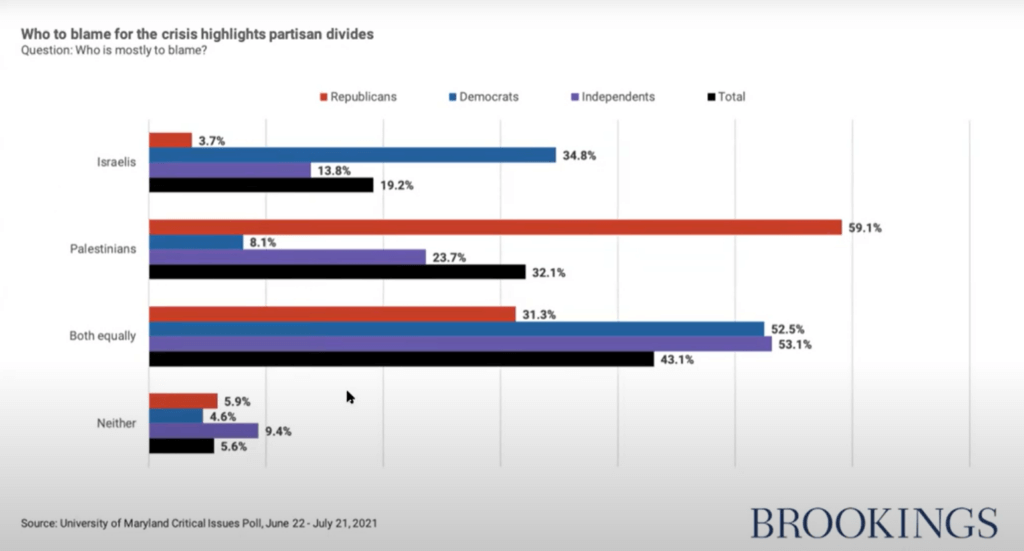
This is because Democrats blame Israel overwhelmingly for the conflict.
Now, if you recall, the President himself pinned the blame, principally on Hamas… and refused to directly criticize Israel and Israeli action. But… when it comes to blaming Israelis [or] Palestinians directly… the blame is far more on Israel among Democrats than it is on the Palestinians… 34.8 percent to be specific blame Israel and 8.1 percent blame Palestinians.
That tells you the story right there. That’s what Biden was dealing with, when people were not understanding why he’s not at least criticizing both sides. Why were you placing …no blame on Israel at all, during that crisis?
The shift is most dramatic among young Democrats. Telhami focused on two polls in the last year, showing that Democrats under 35 went from leaning slightly more toward Palestinians than Israel to overwhelmingly on the Palestinian side.
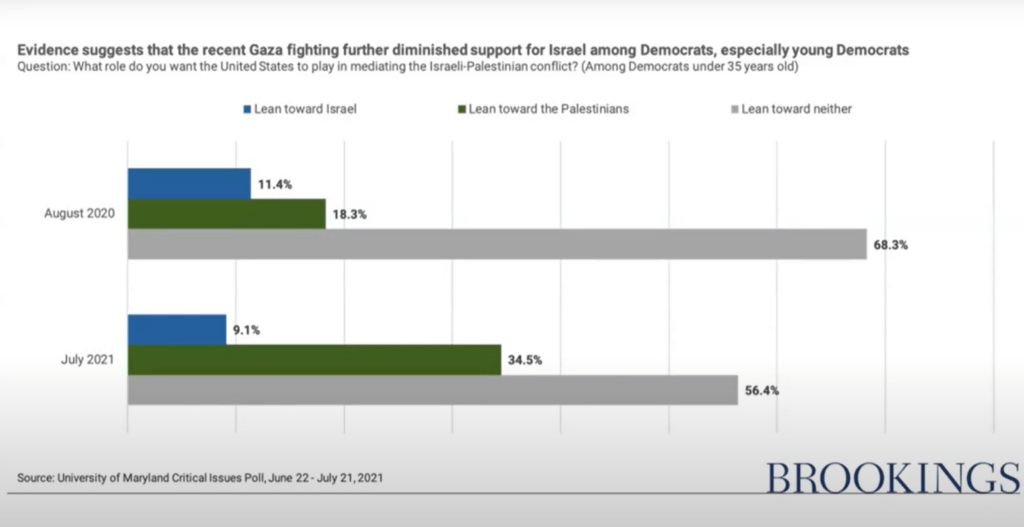
“In August 2020, you had more… young Democrats say they wanted to lean toward the Palestinians more than Israel, 18.3 versus 11.4.
“But look at the change that occurred in one year– now it is 34.5% versus 9.1% for Israel. That’s almost four times the number of people who want to lean toward [Palestine than toward] Israel. Now, that’s a that’s a shift that given all of what I said earlier, is in all probability connected to the Gaza War.
“It’s impossible to have that kind of shift in one year…. [It] is the largest shift we have ever seen on this issue in one year. And it is certainly the highest percentage of Democrats who want to outright lean toward the Palestinians that we have ever captured.
This is even after the “change” government embraced by liberal Zionists in the U.S.
“So even though Netanyahu, who was obviously disliked by many Democrats was out of the picture, and there was a sense that, oh, there’s maybe an alternative that will be closer to the Biden administration, you still have this: that people are not buying that that change is going to alter their view of Israel…
It all adds up to Biden taking an approval hit over Israel.
I would even posit that this issue of Biden’s position on Gaza could have hurt him in his overall ratings. We do know that over the past couple of months, the president’s approval ratings have diminished going down to 49 percent, and that decline is almost entirely coming from Democrats…. Now, obviously, there are many issues why that’s the case. Israel-Palestine may be a small part of it. But it certainly didn’t help. And there’s no question that we have evidence that it certainly didn’t help them, especially among young Democrats.
That goes along with data showing that by an overwhelming ratio, 43.7 percent to 8.5 percent, Democrats want to apply more pressure on Israel, including withholding aid, than apply more pressure on the Palestinians.
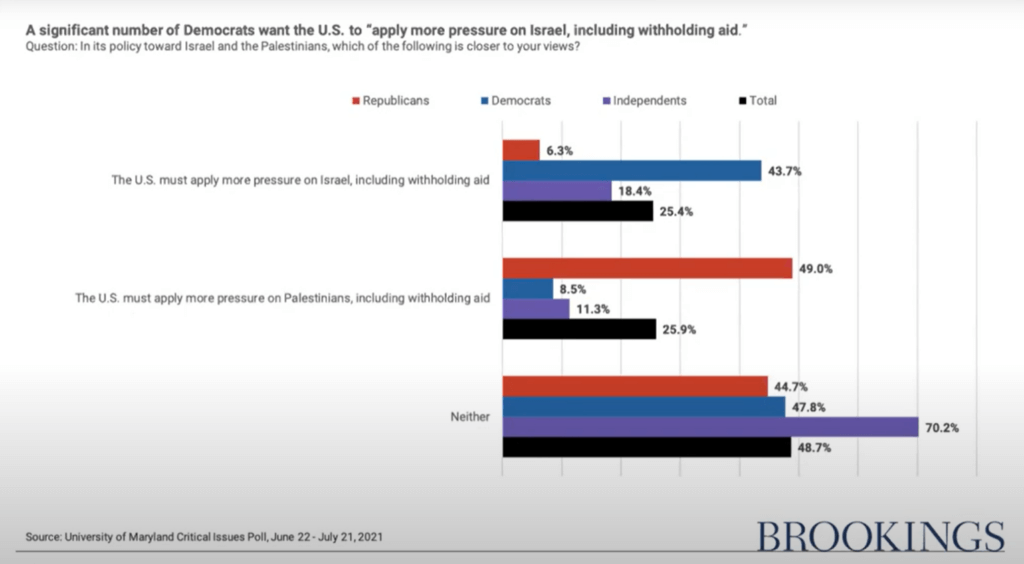
Others have found the same result. Gallup and Pew polls show that a majority of Democrats now want to pressure Israel. They are joined by the Chicago Council on Global Affairs poll released in August, showing that by 62 to 32 Democrats support restricting military aid to Israel, and overall half of Americans take that position.
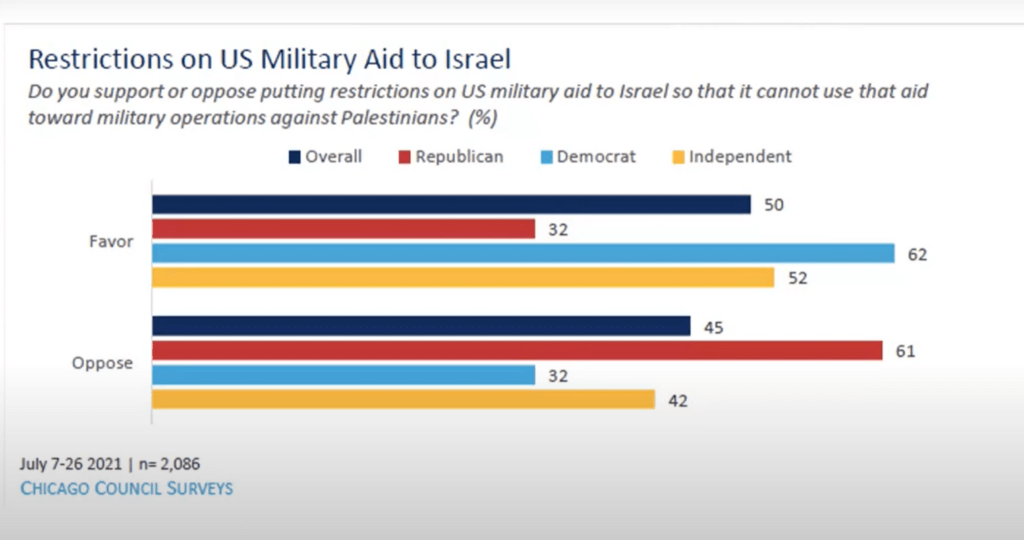
Telhami says that the attitude is beginning to be expressed by mainstream Democratic Congresspeople who know where their constituents are. Maryland Senator Chris Van Hollen, he said, has suggested “creating some kind of linkage” between aid and Israel’s human rights record.
“There’s always been a gap between the elected officials, whether they’re in the White House or in Congress, and the public on Israel-Palestine, especially among Democrats. I’ve been documenting this for nearly a decade…. [The] Democratic public is increasingly critical of Israeli policies and they want the U.S. to be more even handed, and obviously, elected officials stick to a position to the right of their constituency on this. And the question is, in my ear that I’ve raised over the years, is this sustainable is just going to narrow over time,
The pro-Palestinian sentiment is stark in the Democratic base.
“Almost twice as many Democrats want [the U.S.] to lean toward the Palestinians than want [the U.S.] to lean toward Israel. 17.9% versus 9.5%.”
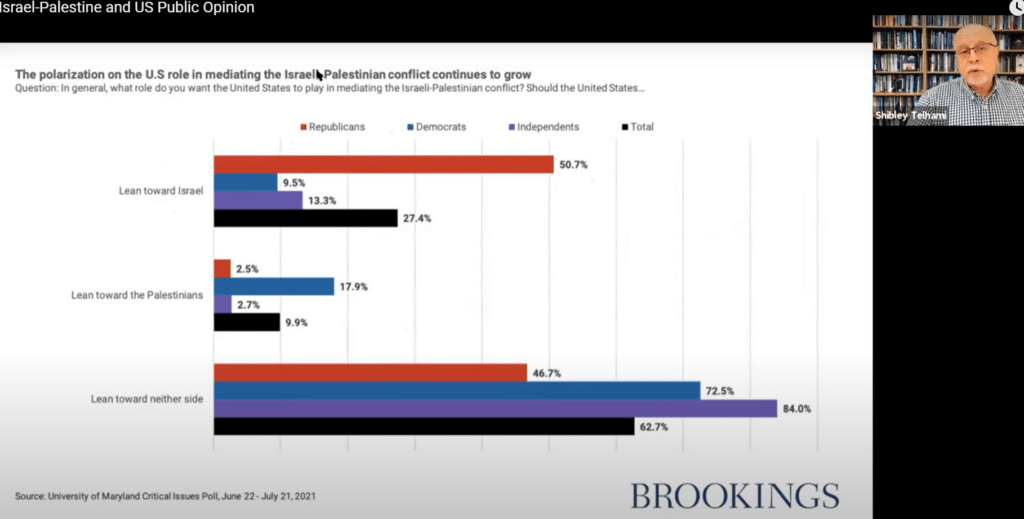
And two thirds of Democrats say their elected officials “are leaning more toward Israel… than they are… They know that their elected officials are to the right on this question.”
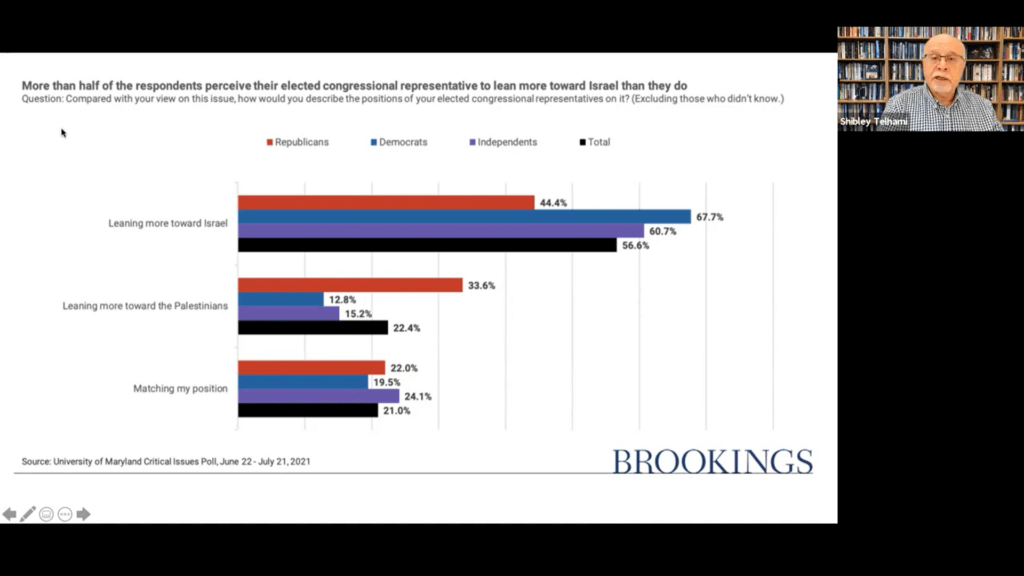
Telhami went on to track a surprisingly-similar change among young evangelical Christians, “who may be walking away from Israel.”
A University of North Carolina poll shows a “huge” drop in sympathy for Israel among evangelicals, 18-29-years old. Their sympathies changed over three years, from 2018 to 2021 (pre Gaza war).
Big change… You can see the drop in the sympathy with Israel drops from 69% to 33%. And sympathy with the Palestinians increases from five to 24%.
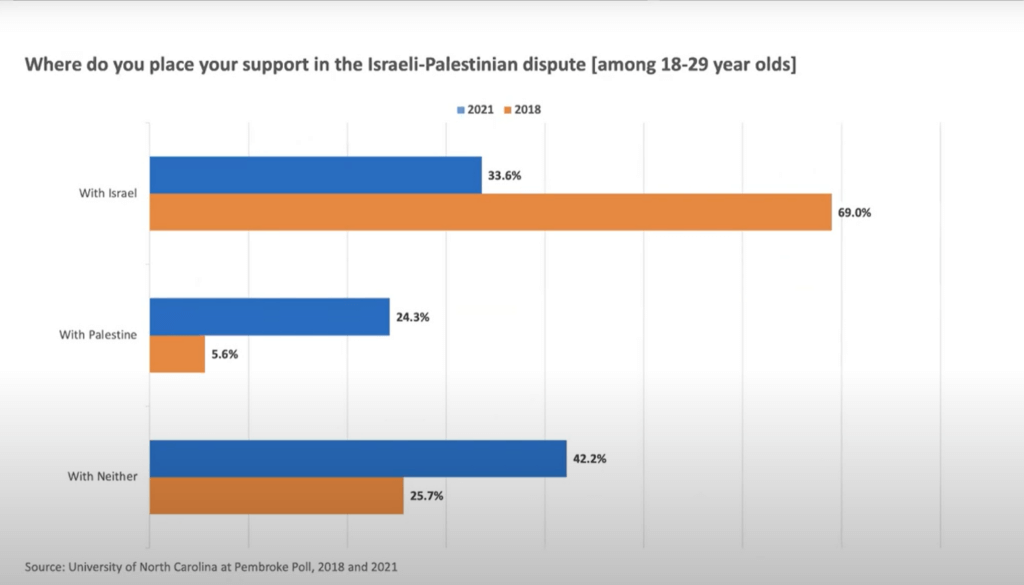
Some of this shift can be explained by demographic data: the fact that among young evangelicals, a majority are now minority ethnically/racially.
Telhami says that he is not sure how much the change in discourse is affecting politics.
Israel-Palestine is not a top priority issue for most Americans. And that’s what shields politicians from feeling the heat on this issue….
Obviously even people who are angry with politicians on on this issue are not going to necessarily vote on the basis of it. And yet, I think we have seen already that it has impacted the electoral process. It has impacted in primaries, where many, you know, politicians in Democratic primaries have shown that actually, you can turn some criticism of Israeli policies into an advantage rather than a detriment in electoral politics– you’ve seen that multiple times in the last two elect election cycles.
He said the shift is reflected in social media, and with mainstream media “catching up, so to speak.”
The New York Times… putting the faces of the children on the front page… who were victims of the [Gaza] war. That’s not something we had seen before in, in mainstream media. I mean, that was quite extraordinary.
He also referenced surveys of experts showing that the destruction of the two-state solution is fostering the “apartheid” discourse on the left. Last February, Telhami and Marc Lynch did a survey of more than 500 Middle East scholars who are members of the American Political Science Association and/or the Middle East Studies Association.
When you ask them, How would you describe Israel Palestine now?… 55 percent say Israel/Palestine is now a one state reality, akin to apartheid. That is telling you that it’s not just about policy, right. It iss about the entrenchment of the occupation after a half a century with no end in sight, that people find just absolutely unacceptable, people who are focused on the social justice issue.
I take that group, because I think, you know, sure, it’s not going to represent the American public opinion or even the scholarly world period. But these people follow the issue closely. And they do tend to be quite ahead of a shift. And so I think there’s something deeper that is going on.
The question is, whether it’s going to impact policy or not. It’s not whether it’s happening. It is happening.
So where are the Palestinian voices in mainstream media?
Mondoweiss covers the full picture of the struggle for justice in Palestine. Read by tens of thousands of people each month, our truth-telling journalism is an essential counterweight to the propaganda that passes for news in mainstream and legacy media.
Our news and analysis is available to everyone – which is why we need your support. Please contribute so that we can continue to raise the voices of those who advocate for the rights of Palestinians to live in dignity and peace.
Palestinians today are struggling for their lives as mainstream media turns away. Please support journalism that amplifies the urgent voices calling for freedom and justice in Palestine.
Related posts:
Views: 0
 RSS Feed
RSS Feed

















 September 7th, 2021
September 7th, 2021  Awake Goy
Awake Goy  Posted in
Posted in  Tags:
Tags: 
















